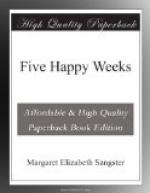FIVE HAPPY WEEKS.
CHAPTER I.
“Good-by, mamma!”
“I don’t see how I can do such a thing,” said mamma, shading her eyes with a hand so white and thin that you could almost see through it. “I never, never can go away, for five weeks, and leave these children; I should not have a moment’s peace.”
“But, my darling,” said papa, “the doctor says it is the only thing that will restore your health. The children will be nicely taken care of, and I am sure they will be as good and obedient as possible while you are gone.”
“You are going too, William; you seem to forget that. And we have never been away from them before. What if Edith or Mabel should be sick, or Johnnie should fall and break his arm, or—”
“Don’t conjure up dreadful possibilities, Helen,” said papa; “I’ll tell you how we will manage it. This house shall be shut, and we’ll take grandma and the children with us as far as Norfolk, and leave them there with your Aunt Maria, while we make our trip. And we will stop for them on our way home. What do you think of that plan?”
“Well,” said mamma, with a faint smile, “I think I’ll leave it to you. It tires me to have to reason things out. Auntie would be kind to them, I know, and I should feel easier if this house were shut up altogether.”
Mrs. Evans had been ailing all the long cold winter, and as Spring began to approach, she drooped more and more, until her husband and her friends feared she would die. Then Dr. Phelps advised a short journey to Florida and Mexico. He said she needed sea-air, and change, and flowers. So it was settled that she should attempt it.
The children were having a frolic in the play-room while this talk had been going on. Johnnie and Mabel had been arranging a little basket of fruit for their mother, oranges, apples and grapes, and now they were disputing as to which should present it to her.
“I ought to, I’m the oldest,” said Johnnie. “I’m the biggest and the strongest, and I will take it in to mamma myself.”
“The bigger and the stronger ought to yield to the smaller and the weaker,” said a sweet voice. The children looked round, and saw a little lady whom they all liked. She was Miss Simms, the dressmaker. Her face was as round as an apple, she had two bright black eyes, and when she laughed the dimples seemed to chase each other over her cheeks.
“I’m so glad you’ve come,” said Mabel, running away from the fruit to put her two fat arms as far round Miss Simms as they would reach.
“I am glad, too; it’s jolly,” said Johnnie. “But I’d like to know why you think the bigger ought to give up to the littler. That’s what I can’t understand. In the history books they never do it. The strong always whip the weak.”
“Well,” said Miss Simms, “I’m not much of a scholar, and I’ve never read many history books, as you call them, Master Johnnie; but I’ve read my Bible, and I get my learning out of that. I’ll tell you some of my verses, and you can see what you make of them.




